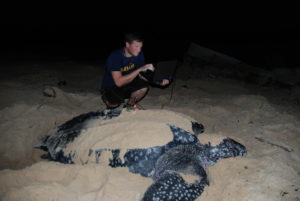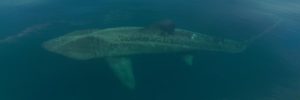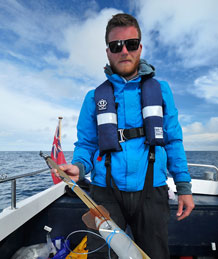Our world-leading marine research underpins a wide range of undergraduate and postgraduate programmes: Research-led teaching | Exeter Marine | University of Exeter. In this #MScGraduateInFocus series we are looking back on some of our MSc graduates who have excelled in marine conservation around the world since studying with us.
Today we meet Phil Doherty, MSc Conservation and Biodiversity graduate (2011) and now a Post Doctoral Research Associate with the University of Exeter!

Hi Phil! First off, why don’t you tell us what you are up to now and how you got there?
Upon finishing my MSc I was offered a short-term contract (3 months) in Penryn as a field assistant analysing video data captured from Baited Remote Underwater Videos (BRUVs) at renewable energy testing sites. This turned into a longer contract (18 months) continuing to develop methodology and analysis of the BRUV project. During this time I was part of applying for funding with the Scottish Government to satellite track basking sharks with the aim of designating a Marine Protected Area (MPA) in Scottish waters. This bid was successful and became my PhD. I completed my PhD in 2017 and worked short-term on a few ongoing projects within the wider ExeterMarine group as a research assistant before acquiring my current postdoctoral position. I have been very lucky in being given the chance to work on a wide range of projects and to be supported in roles within the research group.
It’s lovely to have you with us! What do you enjoy most about studying and working with us at the University of Exeter Cornwall Campus?
The location itself is a massive draw. The campus and surrounding towns are very close to many beautiful beaches. I think the fact that the CEC is actively involved in cutting edge research is a huge plus in terms of conducting a masters within the department. This access to research groups and data makes for exciting projects from which to write your thesis. It can also provide opportunities to work on real data that may contribute to ongoing research projects on the whole. For me this was the best part of my MSc, conducting fieldwork with a NGO.
I was looking to broaden my skillset, but also be exposed to academic research. I was unsure of the exact route I wanted to take in the sector and so experience in different facets of research and research groups, NGO’s, consultancies etc. sounded like a good opportunity to find out which aspects suited me to pursue further.
The staff’s openness and willingness to engage and help throughout the course was great, it felt like they cared and wanted you to succeed. The fieldcourse to Kenya was an obvious highlight. It was great to learn about current conservation issues and how those working in the field are attempting to manage and mitigate these issues.

How did the MSc help you in your career, and do you have any advice for students looking to pursue a similar career?
It turns out research was the element I enjoyed most, and so the time to be able to conduct a thesis was the highlight of the course for me, but also the part which best set me up to pursue the next phase of my career. I was lucky enough to get a position with a NGO working on various aspects of applied marine conservation. Using a long-term dataset and ground-truthing results in the field provided me with many skills in which I would need to progress.
I chose to pursue applied marine ecology and conservation as a career as I’ve always been fascinated with the ocean and the animals living within it – especially when and where animals move to/from. I also feel the knowledge gained on species should be used to some extent to help update or inform other knowledge gaps and this is a great avenue for that.
Finally, Do you have any advice for anyone thinking of applying to any of our programmes at the University of Exeter?
I would think about what you would like to get out of obtaining a masters, and how it might shape the next move you make. Do some research, contact members of staff to enquire about ongoing research and opportunities. Treat it like a job and make the most of the expertise and experience on offer.
Thanks Phil!

You can see what Phil gets up to at the University of Exeter at his Profile and you can follow him on Twitter!
If you want to find out more about any of our suite of #ExeterMarine Masters and Undergraduate courses use the links below!
- NEW: MSc in Marine Vertebrate Ecology and Conservation
- MSc in Conservation and Biodiversity
- MSc in Conservation Science and Policy
- MSc in Evolutionary and Behavioural Ecology
- MSc in Sustainable Development
- MSc in Environment and Human Health
- MSc in Renewable Energy Engineering
- BSc Marine Biology
- BSc Zoology
- BSc Environmental Science
- BSc Conservation Biology and Ecology
- BSc Evolutionary Biology
- BSc Animal Behaviour
- BEng Renewable Energy Engineering
